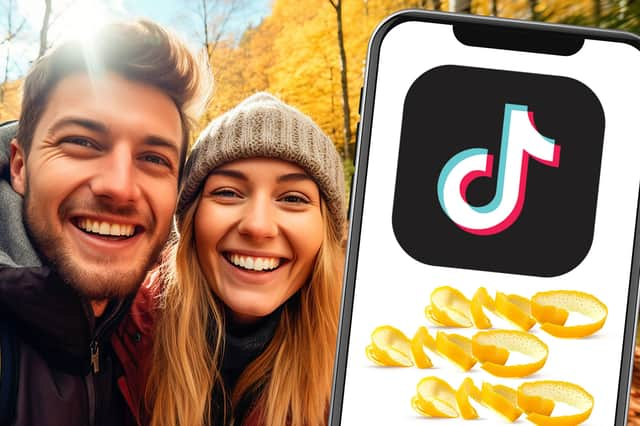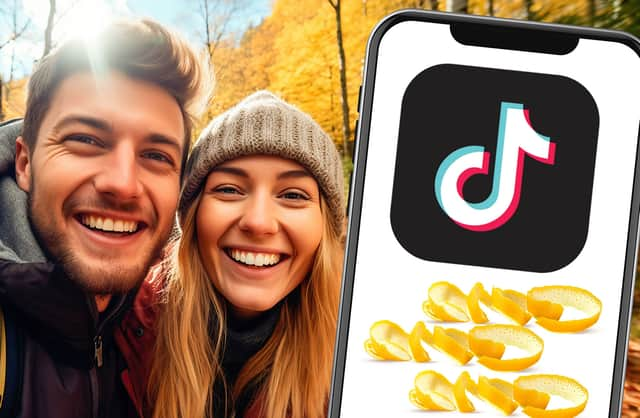The orange peel theory: Viral TikTok relationship trend explained & why experts think it's positive & negative


TikTokers love to talk about a wide variety of topics, but one of the most prominent subjects is relationships.
In recent weeks, the viral string theory, along with dating terms spider webbing and polter ghosting, have all been so widely discussed on the social media platform that they have gone viral. Now, another trend has gone viral - the orange peel theory.
Advertisement
Hide AdAdvertisement
Hide AdVideos of people discussing the trend, and how it applies in their lives and romantic partnerships, have received billions of views on the platform - and that number is growing daily. But, opinion is divided on - some people think it's brilliant, while others think it's problematic. But, what exactly is the trend, what have people been saying about it on TikTok, and what do relationship experts think of it? Here's what you need to know.
What is the orange peel theory?
The orange peel theory is simple; it relates to how people in relationships act with one other. The theory is simple: If your loved one peels an orange for you without being asked then they are said to be a good partner, friend, parent and so on, and your relationship is therefore said to be a success. The act of peeling an orange can also be substituted for any small everyday task, and does not have to be taken as literally peeling the fruit.
Doing an everyday task is said to be a sign that the person truly does love and care for you as a person who does little things to help you or make your day a little brighter is always thinking of you. It’s all about doing something for the other just because they can, not because they have to. Examples could include making a cup of tea, doing the washing up or cleaning the shower.


What has been said about the orange peel theory on TikTok?
A TikTok user, Jenna (@jennaskates), who is also a baker, recently went viral after posting a video of her boyfriend giving her containers of eggs with all the whites separated from the yolks. He painstakingly did in his own spare time after she had off-handedly mentioned days before that she’d been struggling to separate the egg whites due to her long nails. “And this man took time to pre-separate the egg whites from the yolks for me,” Jenna wrote in the video’s overlaid text. “He saw me! Never thought egg white would make me cry.”
Advertisement
Hide AdAdvertisement
Hide AdMany cited the baker’s video as the perfect example of the orange peel theory at work. One said: "Next time I see someone asking what the orange peel theory is I'm tagging them in this". Another added: "This is actually so heartwarming, so so happy you get to experience this type of genuine love."
Others said that orange peel theory is specifically about a loved one doing an act for you that you can do yourself, but they know by doing it for you they will make your life easier. And that loved one doesn't have to be a romantic partner. The theory also applies to friendship and familial connections as well.
For example, a teacher posted a video stating that, although they have learned to do it themselves, they still always tie their pupil's shoes for them. In another video, a mum said she always pours her children's drinks at breakfast time and puts their cereal in their bowls, even though they are perfectly capable of doing it themselves.
Along with many gushing videos explaining how their other halves have passed the orange peel theory test, there's also videos of people explaining that the trend has made them think that their other half doesn't treat them right and now they are considering breaking up with them.
Advertisement
Hide AdAdvertisement
Hide AdOne person said she was dismayed that her boyfriend would not do small tasks for her, like tieing up her hair or putting a towel in the tumble dryer for her, even when asked. She said learning of the theory had led to her finishing the relationship as it made her reflect on the fact that she believed she deserved more than what her now former beau was giving her.
Rebecca Dakin, who is a hypnotherapist and coach, specialising in dating, sex and relationships, has also posted videos about the theory on her TikTok page @hypnotherapistrebecca. She told NationalWorld: "The orange peel theory is a helpful guide for all our relationships, romantic and otherwise. The key thing to recognise is that to be a good ‘orange peeler’, so to speak, you have to have firm boundaries and only give or do what you can selflessly and without losing a part of yourself."
What do experts think of the orange peel theory?
The co-founder of Select Personal Introductions dating agency and internationally certified matchmaker and relationship coach, Alex Mellor-Brook, told NationalWorld that the theory "touches on a more profound truth about relationships". He adds: "Love, in its most genuine form, often manifests in the smallest gestures. It's not always about grand declarations or over-the-top displays of affection. Sometimes, the quiet, unassuming acts carry the most weight - making them a cup of tea after a long day or simply being there to listen. These actions might seem insignificant, but they're foundational to building and maintaining a strong, loving relationship."


This demonstrates a commitment to nurturing and strengthening your relationship
Additionally, he says this theory corresponds closely with the concept of love languages. Just as words of affirmation, quality time, receiving gifts, acts of service, and physical touch are ways to express and receive love, so are these small, everyday actions. Peeling an orange can be an act of service, a simple yet meaningful gesture that says 'I care about you'. He explains: "This demonstrates a commitment to nurturing and strengthening your relationship, highlighting the importance and value you place on your partner."
Advertisement
Hide AdAdvertisement
Hide AdSerena Novelli, certified intimacy, love and relationship expert, told NationalWorld that the trend can be viewed both positively and negatively. On the one hand, she agreed with what Mellor-Brook said. "However, there are potential pitfalls to this trend. Reliance on such gestures to gauge the depth of a partner's love might oversimplify the complexities of a relationship", she warns.
"Love and affection can't always be measured by a single act, especially one as mundane as peeling an orange. The danger lies in placing too much emphasis on this act, which might lead to misunderstandings or unrealistic expectations. Not everyone expresses their love in the same way, and some might find this task trivial or unrelated to their feelings."


She also said that showcasing the act of peeling an orange on social media can be problematic because "the performative aspect of social media trends like this can sometimes distort genuine relationship dynamics". She adds: "While it's fun and engaging to participate in such trends, it's important to remember that real relationships are built on a foundation of mutual understanding, respect, and communication, far beyond the scope of a viral challenge."
Master coach and authorised Language of Listening coach Camilla Miller went as far as calling the trend "silly and manipulative". She tells NationalWorld: "Expressing love and receiving love can vary widely among individuals. Sometimes what one person perceives as a loving gesture might not resonate that same way with someone else.
Advertisement
Hide AdAdvertisement
Hide Ad"Imagine that you peel oranges or do small everyday tasks out of love for your partner because you think you’re being loving. But your partner feels smothered and feels you don’t have confidence in them to be able to do it for themselvelves - they would get annoyed by it. So, it's far better to understand and respect each other’s preferences and boundaries."
Relationship coach and founder of Banish life coaching for women Louise Tullin, also points out to NationalWorld that a partner doing everything for their other half, especially in the early stages of a relationship could be love bombing and also says she believes that, even in cases with the orange peel theory is applied healthily, "we shouldn’t glamourise this behaviour, we need to normalise people".
Comment Guidelines
National World encourages reader discussion on our stories. User feedback, insights and back-and-forth exchanges add a rich layer of context to reporting. Please review our Community Guidelines before commenting.
